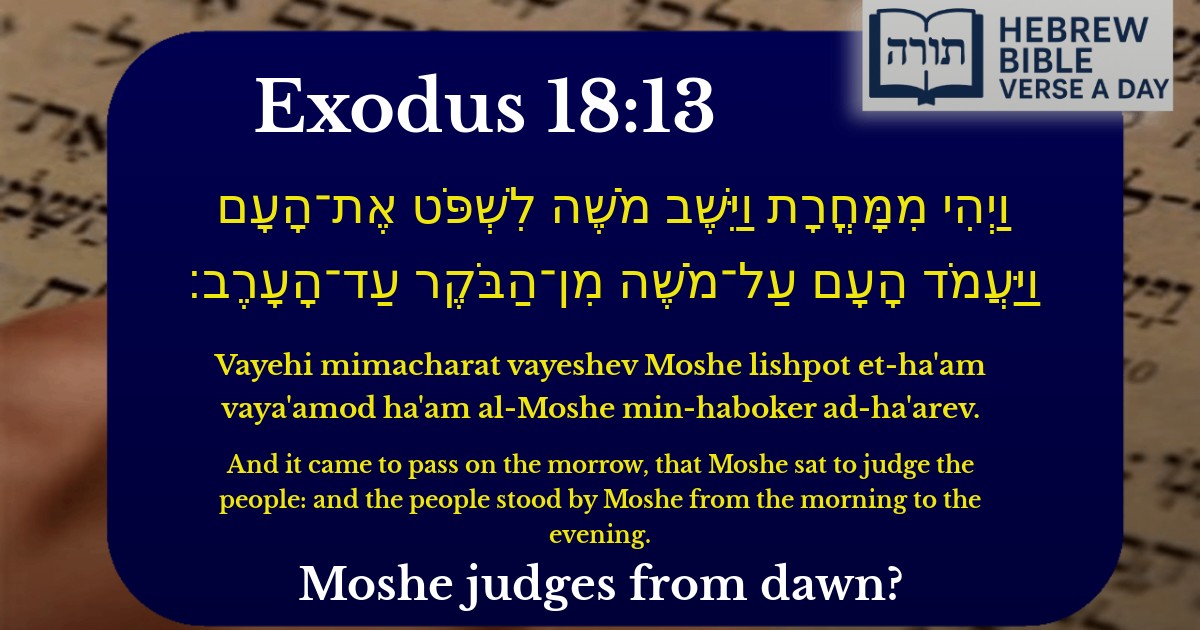Join Our Newsletter To Be Informed When New Videos Are Posted
Join the thousands of fellow Studends who rely on our videos to learn how to read the bible in Hebrew for free!
Hebrew Text
וַיְהִי מִמָּחֳרָת וַיֵּשֶׁב מֹשֶׁה לִשְׁפֹּט אֶת־הָעָם וַיַּעֲמֹד הָעָם עַל־מֹשֶׁה מִן־הַבֹּקֶר עַד־הָעָרֶב׃
English Translation
And it came to pass on the morrow, that Moshe sat to judge the people: and the people stood by Moshe from the morning to the evening.
Transliteration
Vayehi mimacharat vayeshev Moshe lishpot et-ha'am vaya'amod ha'am al-Moshe min-haboker ad-ha'arev.
Hebrew Leining Text
וַֽיְהִי֙ מִֽמׇּחֳרָ֔ת וַיֵּ֥שֶׁב מֹשֶׁ֖ה לִשְׁפֹּ֣ט אֶת־הָעָ֑ם וַיַּעֲמֹ֤ד הָעָם֙ עַל־מֹשֶׁ֔ה מִן־הַבֹּ֖קֶר עַד־הָעָֽרֶב׃
וַֽיְהִי֙ מִֽמׇּחֳרָ֔ת וַיֵּ֥שֶׁב מֹשֶׁ֖ה לִשְׁפֹּ֣ט אֶת־הָעָ֑ם וַיַּעֲמֹ֤ד הָעָם֙ עַל־מֹשֶׁ֔ה מִן־הַבֹּ֖קֶר עַד־הָעָֽרֶב׃
🎵 Listen to leining
Parasha Commentary
📚 Talmud Citations
This verse is quoted in the Talmud.
📖 Sanhedrin 7a
The verse is referenced in a discussion about the proper times for judges to hold court, emphasizing the importance of not overburdening judges with cases from morning till evening.
📖 Yoma 2a
The verse is cited in a discussion about the dedication and endurance required of leaders, using Moshe's example of judging the people from morning to evening.


Context in Shemot (Exodus 18:13)
This verse describes Moshe Rabbeinu's role as the sole judge for Bnei Yisrael after Yetziat Mitzrayim (the Exodus from Egypt). The scene occurs shortly after Yitro's arrival, where he observes Moshe adjudicating disputes from morning until evening.
Rashi's Explanation
Rashi (Rabbi Shlomo Yitzchaki) comments that the phrase "וַיֵּשֶׁב מֹשֶׁה לִשְׁפֹּט" ("Moshe sat to judge") implies Moshe established himself as a permanent judge for the people. Rashi further notes that the people stood "מן הבקר עד הערב" ("from morning to evening")—not because the cases were overly complex, but due to the sheer volume of disputes brought before him. This highlights Moshe's immense patience and dedication to justice.
Rambam's Perspective on Judicial Leadership
Rambam (Maimonides) in Hilchot Sanhedrin (Laws of Courts) 1:1-2 derives from this episode that a single judge cannot sustainably handle an entire nation's legal matters. This leads to Yitro's later advice (Exodus 18:17-23) to establish a hierarchical court system—a foundational principle for Jewish jurisprudence.
Midrashic Insights
Practical Lessons
The verse teaches: